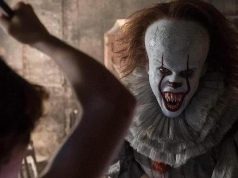Like most of his movies, Christopher Nolan’s “Interstellar” is about the conflict between human weakness and human ambition. Whether it’s an amnesiac tracking a killer, a troubled billionaire dressing as a bat to wipe out injustice, or the last remnants of mankind seeking a new Earth, what we want to do is often far greater than what we’re capable of.
Some Nolan characters brood and beat themselves up over these shortcomings (I can easily imagine Nolan being the same way), but Cooper, the protagonist in “Interstellar,” is more of an optimist. He’d almost have to be, being played by Matthew McConaughey. Cooper named his daughter after Murphy’s Law (“Anything that can go wrong will go wrong”) because he sees it as an affirmation: “Whatever CAN happen, WILL happen!” Late in the film, in a bit of dialogue that’s almost thrown away yet seems to encapsulate the whole thing, he calls for a course of action and is told, “It’s not possible.” His response: “No, it’s necessary.”
“Interstellar” is hugely ambitious, a 169-minute sci-fi adventure that takes old tropes (space travel, alien planets) and applies fresh new studio money to them. Visually, it’s a triumph. Nolan and his team (including cinematographer Hoyte Van Hoytema) use seamless special effects and models to create an awe-inspiring view of the solar system and beyond. They even manage to convey a four-dimensional concept in three dimensions (well, 3D for the characters; 2D for us), just the sort of mechanical wizardry you’d expect from the guy who made cities collapse on themselves in “Inception” merely as a visual aid.
But like so many Nolan characters, “Interstellar” (which he co-wrote with his brother Jonathan) bites off more than it can chew and comes up frustratingly short. We’re supposed to feel a strong emotional connection to the story (perhaps a first for Nolan, who’s usually stark and unsentimental), and all the elements are in place to make it happen … and then it never quite does. Instead, we have a film that’s often fascinating, sometimes thrilling, sometimes tedious, but always strangely aloof, despite its best efforts. The movie’s easy to admire, hard to love.
Cooper and his kids, science-minded Murph (Mackenzie Foy) and undefined Tom (Timothee Chalamet), live with their grandfather (John Lithgow) on a dusty farm a few generations from now. After being decimated by famine and drought, what’s left of the population is rebuilding society, hoping it’s not too late for Earth to be made habitable. (There’s that optimism again!) Meanwhile, NASA types played by Michael Caine, Anne Hathaway, Wes Bentley, and David Gyasi have been working on a secret plan to find a suitable new planet, aided by a wormhole out near Saturn that’ll get you to another galaxy lickety-split. Cooper, once the military’s best pilot, is tapped to lead the expedition to determine which (if any) of the newly discovered planets will work.
So … SPACE ADVENTURE! That means cryo-sleep, deceptively analog-looking robots, and weighty conversations about dimensions, limited resources, and Einstein’s Theory of Relativity. Time works differently near a wormhole, you know. A few hours out here could be years back on Earth. It’s a reversal of McConaughey’s famous line from “Dazed & Confused”: the people on Earth get older while he stays the same age. And it matters because Cooper wants to return home before his children have lived out their lives.
Nolan periodically intercuts between the action with Cooper and his fellow astronauts and the scene back on Earth, where time has indeed passed and Cooper’s children Tom and Murph have grown up into Casey Affleck and Jessica Chastain. The parallel stories and themes (stubbornness, frailty, hubris) add depth, but it’s undercut by the curious neglect of Tom as a character, leaving him as dead weight. Why give Cooper two children when you only needed him to have one?
Missteps like this are disappointing because when “Interstellar” is good, it’s magnificent. The action scenes set on alien planets are exhilarating, outer space looks gorgeously vast, and the idea of love being a powerful force in the universe is ennobling. This is certainly the most humanistic movie Nolan has made, the one that feels closest to the real emotions of actual people. But it’s still off the mark, a sci-fi spectacle full of fine, teary-eyed performances but powered by a cold, mechanical heart.
B- (2 hrs., 49 min.; )
Originally published at GeekNation.





